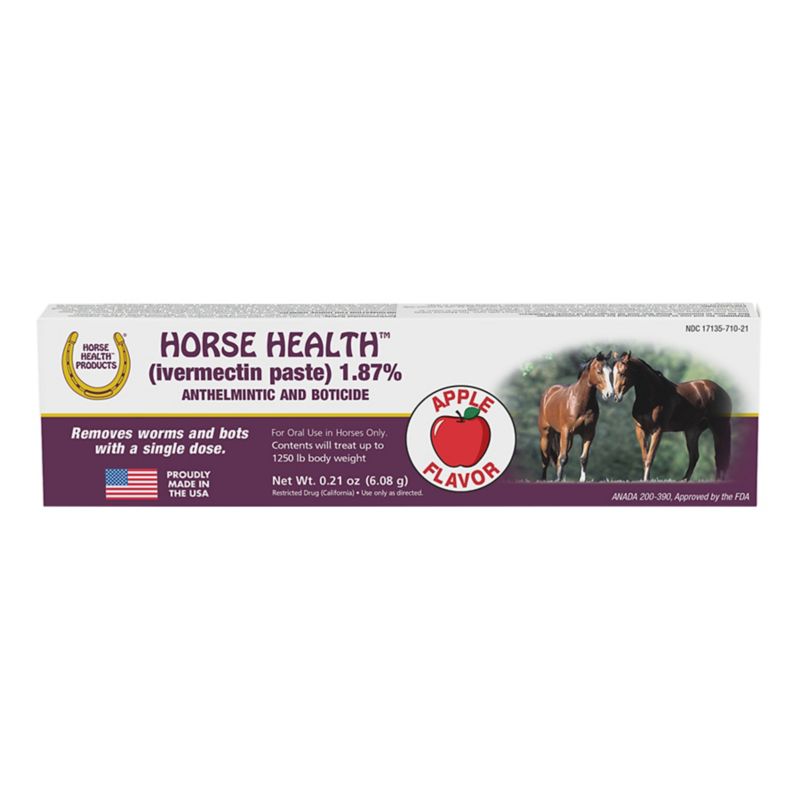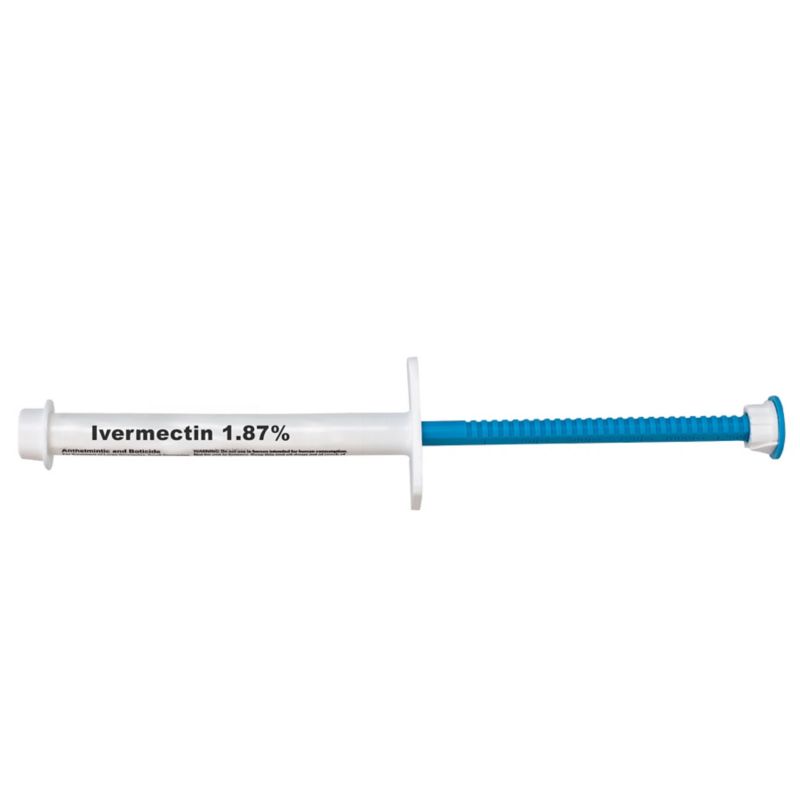Ivermectin for Horses
What is ivermectin?
Ivermectin (pronounced \ ī-vər-ˈmek-tən\) is used to control parasites in lots of different animals including humans. This blog is about using ivermectin as an over-the-counter (OTC) chemical dewormer indicated for controlling parasites in horses. Though ivermectin is packaged and sold in different forms, this blog is about ivermectin paste for oral use in horses.
Why do you need a chemical dewormer like ivermectin?
Parasites have been around for thousands of years and no horse is entirely immune to parasites. Which means one or more parasites infect all horses. One of the most concerning aspects of parasitic burden in the damage caused to your horse’s gastrointestinal (GI) tract.
Your horse consumes most parasites while grazing. After entering your horse, some parasites burrow through your horse’s respiratory, circulatory and intestinal systems until they take up permanent residence in your horse’s large intestine. When left untreated, parasites cause inflammation, ulcers and damage your horse’s intestinal lining. Also, certain types of parasites are thought to contribute to colic, anemia, and nutritional deficiencies.
Why is it called ivermectin?
Ivermectin is the dewormer’s active pharmaceutical ingredient which controls the parasites. Current horse dewormers only contain a 1.87% concentration of ivermectin with the remaining 98.13% of the medication being filler.
Ivermectin was introduced in the early 1980’s. It belongs to one of the five drug classes used to control parasites, worms and bots in horses.
The five drug classes are:
- Benzimidazoles include Fenbendazole and Oxibendazole
- Heterocyclic Compounds includesPiperazine
- Macrocyclic Lactones include Ivermectin and Moxidectin
- Tetrahydropyrimidines include Pyrantel Pamoate & Pyrantel Tartrate
- Isoquinoline-Pyrazines include Praziquantel
Ivermectin belongs to the Macrocyclic Lactones class of drugs. Each of these drug classes targets specific parasites at various stages of their development.
So many parasites, so little time
Which parasites does ivermectin control?
Ivermectin kills and controls 43 species of parasites, worms and bots in a single dose, including:
|
- Red Worms (small strongyles) |
- Hairworms |
|
- Blood worms (large strongyles) |
- Bots |
|
- Roundworms (Ascarids) |
- Intestinal threadworms |
|
- Pinworms (Oxyuris) |
- Lungworms |
|
- Stomach worms (Habronema) |
|
Ivermectin is also effective at controlling external parasites such as lice, mites, ticks and the skin-dwelling larvae of Onchocerca.
How does ivermectin work?
For equine dewormers to be effective, they must be selectively toxic to the parasite without adversely affecting the host. In order words, the dewormers must kill the parasites while not hurting the horse.
When appropriately used, ivermectin blocks the nerve transmission and paralyzes the parasite, so it cannot consume nutrients nor hold its position in a horse and therefore is expelled along with a horse’s manure.
In the United States, ivermectin is typically given to a horse in a single dose oral paste which begins working within the first 48 hours. For ivermectin to be effective, a parasite must be exposed to the drug. Therefore, ivermectin is not effective against parasite larvae that have burrowed into a horse's tissue (encysted parasites). Additionally, ivermectin is not effective against tapeworms. For more information about how to tell if your dewormer is working, check out How to find out if your horse's dewormer is working?
So how do I know if the ivermectin is working correctly?
Gauging how well a deworming treatment is working requires you to measure the dewormer's effectiveness. Measuring a dewormer's effectiveness like ivermectin, is accomplished by testing your horse's parasite and worm burden before administering the ivermectin. This is accomplished by performing a fecal egg count test. A fecal egg count test identifies how many parasite eggs a horse is shedding at the time of the test - finding out this information before you dewormer allows you to establish a baseline to compare against after you treat your horse. This process is called conducting a fecal egg count reduction test (FECT). You can read more about fecal egg count reduction testing at How to find out if your horse's dewormer is working.
A small amount of Ivermectin goes a long way
It only takes a small amount (6.08 grams at a 1.87% concentration) of ivermectin to control 43 species of parasites in a 1250 lbs. horse - that’s only 0.0001715725 ounces/pound, which is 1/10th the dosage of the other equine dewormers. Ivermectin has also been shown to be safe in horses, foals, breeding stallions, and pregnant and lactating mares.
Ivermectin is distributed under a variety of generic and brand names, with the same formulation - 1.87% concentration of ivermectin. Therefore price, convenience and/or brand loyalty drive the purchasing decision. Following is a partial list which is not meant as an endorsement – just some examples of product names, their manufacturer or distributor and the percent concentration of ivermectin.
| Product Name | Mfg. or Dist. | % Ivermectin |
|
Zimecterin |
Merial |
1.87% |
|
Bimectin |
Bimeda |
1.87% |
|
DuraMectin |
Durvet |
1.87% |
|
Eqvalan |
Merial |
1.87% |
|
Horse Health |
Horse Health |
1.87% |
|
Ivercare |
Farnam |
1.87% |
Following are three affiliate links for different brands of a single dose of ivermectin paste for horses.
DISCLOSURE: Some of the links below are affiliate links, meaning at no additional cost to you, I may earn a commission if you click through and make a qualifying purchase.

Horse Health 1.87 Ivermectin Single Dose Paste [More] Price: $8.99
Sale: $8.99
|
<

Ivermectin Single Dose Wormer (1.87) [More] Price: $8.99
Sale: $8.99
|

Bimectin Ivermectin Apple Flavored Wormer (1.87) [More] Price: $7.99
Sale: $7.99
|
Good things come in small packages
As I mentioned previously, Ivermectin is used to control parasites in lots of different animals – including humans. So be sure to get the stuff for horses.
When sold retail as an OTC horse dewormer in the United States, ivermectin typically comes in a long thin box which contains a syringe sometimes called an applicator. The syringe is preloaded with enough ivermectin (1.87% concentration) to treat a 1250 lbs horse with a single dose. Ivermectin also comes in flavors (e.g., apple).
But what if my horse weighs less than 1250 lbs.?
The amount of ivermectin administered to a horse depends on the horse’s weight. The most accurate way to obtain a horse’s weight is to use a commercial livestock floor scale. Unfortunately, this method tends to only be available at places like a vet’s office, universities, surgical centers, etc. If a scale is not available, you can use a weight tape designed for horses. A horse weight tape is a plastic or cloth flexible tape with pounds instead of inches or centimeters printed on it. Be sure to use a tape long enough to wrap around the circumference of your horse’s girth.
Once you obtain a horse’s weight, you need to adjust the ivermectin syringe to deliver the proper dose of medication. The syringe’s plunger is divided into five equal 250 lbs increments. You can set the proper dosage by moving the plunger’s locking ring up or down to match your horse weight. NOTE: Each quarter turn of the plunger’s locking ring represents 62.5 lbs. (four quarter turns equals 250 lbs.)
The FUTURE of ivermectin
In some countries, ivermectin requires a prescription, though in the United States ivermectin is currently still available as an over-the-counter (OTC) medication. However, the U.S. Food and Drug Administration (FDA) has recently requested drug companies voluntarily add information about antiparasitic resistance to both OTC and prescription dewormers, including ivermectin.
Resistance is the ability of the worms at your barn, dry lot, pasture, etc. to survive a treatment (same drug, same dose) that once was effective against the same parasite. Resistance grows when parasites survive the treatment and then pass the ability to survive on to their offspring (known as an inherited trait).
Resistance has become a problem for horse owners due to years of over-treating horses with chemical dewormers. Once resistance has developed, it cannot be reduced or reversed.
Ivermectin is no exception when it comes to parasitic resistance. Acarids and pinworms are showing resistance to Ivermectin along with some emerging resistance in small strongyles.
The resistance problem is compounded by the lack of new development of equine deworming products.
Pharmaceutical companies have not introduced any new deworming medications (anthelmintics) for use in horses since 1981, and currently, there is nothing on the horizon.
Therefore it is crucial to use ivermectin as part of a comprehensive parasite control program which continually addresses both parasitic infection and reinfection.
"Even the cheapest dewormer becomes expensive if it doesn’t work at all"
- Martin Nielsen, DVM, Ph.D., Dipl. EVPC, ACVM -
NOTE: The content of this site is for informational purposes only and not intended to be a substitute for professional veterinarian advice, diagnosis, or treatment. Always seek the advice of your veterinarian with any questions you may have regarding the medical condition of your horse.
About Zero Egg Count
Zero Egg Count is an Equine Healthcare company offering diagnostic fecal count test kits and laboratory services. Our inexpensive test kits use a non-invasive collection process that is quick and easy to follow. The test results provide critical information about the general health and effectiveness of your horse's deworming program.
